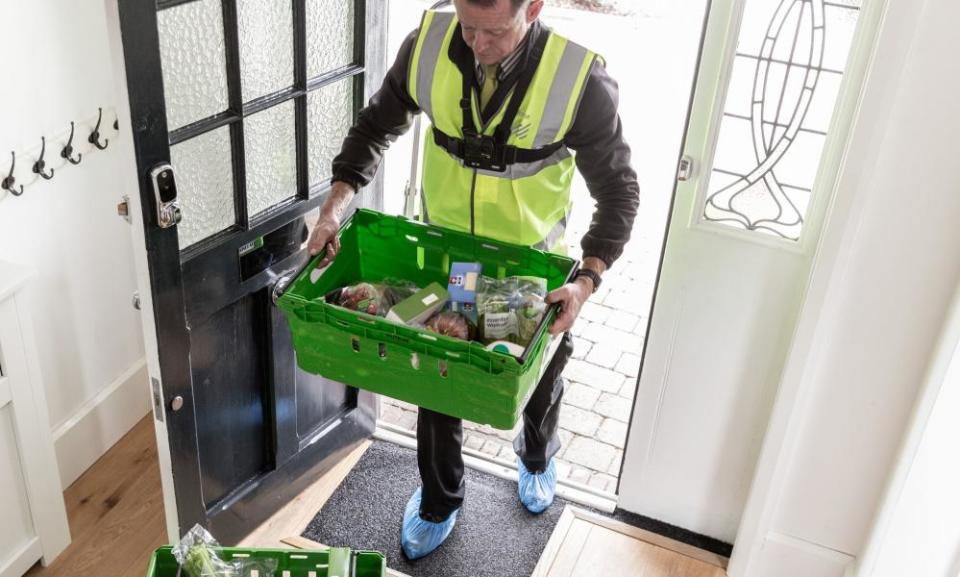Waitrose to set aside quarter of delivery slots for elderly shoppers

Waitrose is setting aside at least a quarter of its online grocery delivery slots for elderly and vulnerable shoppers amid rising concern about food supplies for those isolated at home.
The supermarket is also expanding its online delivery operation as Tesco limits online shoppers to 80 items per order to free up space in delivery vans and service more people sheltering at home during the coronavirus outbreak.
The government will on Saturday begin the delivery emergency food parcels to thousands of the 1.5 million people it has identified as particularly vulnerable.
The boxes will contain basic essentials such as pasta, toilet roll, cans of soup and beans, teabags and custard cream biscuits.
The scheme is targeted at those with specific health issues, such as respiratory conditions including cystic fibrosis or those who have blood or bone marrow cancer, or have had an organ transplant.
What do the restrictions involve?
People in the UK will only be allowed to leave their home for the following purposes:
Shopping for basic necessities, as infrequently as possible
One form of exercise a day – for example a run, walk, or cycle – alone or with members of your household
Any medical need, to provide care or to help a vulnerable person
Travelling to and from work, but only where this is absolutely necessary and cannot be done from home
Police will have the powers to enforce the rules, including through fines and dispersing gatherings. To ensure compliance with the instruction to stay at home, the government will:
Close all shops selling non-essential goods, including clothing and electronic stores and other premises including libraries, playgrounds and outdoor gyms, and places of worship
Stop all gatherings of more than two people in public – excluding people you live with
Stop all social events, including weddings, baptisms and other ceremonies, but excluding funerals
Parks will remain open for exercise, but gatherings will be dispersed.
Those who are healthy but over 70 and have been told to stay at home cannot currently register on the official database of clinically vulnerable to gain additional help from the government.
Many elderly people who rely on deliveries of groceries which either they or a relative buy online have been struggling to place orders because of a massive surge in demand delivery slots.
Online orders usually make up just 7% of the UK grocery market but millions of families have turned to the internet as a way to avoid crowded stores and risk catching the virus.
The government said it was “looking at ways to prioritise those who are at increased risk but are not on the clinically vulnerable list”, but could not confirm its plans on Friday.
The government has pledged to provide supermarkets with its database of those who are clinically vulnerable to help them identify existing shoppers who require extra help.
Waitrose said it was prioritising deliveries using data from its loyalty scheme and customer accounts to identify elderly and vulnerable customers and intended to use information from the government’s database when it was available.
Waitrose said it would be writing to relevant customers this week and had held back delivery slots especially for them. The retailer said 17% of its regular slots had already been booked by vulnerable customers.
It is also extending its Rapid delivery service, which delivers staple items by courier within two hours, to 10 more shops in the next two weeks providing thousands of additional deliveries. The service will go into further shops throughout April.
Ben Stimson, Waitrose.com director, said elderly customers should wait to be contacted about deliveries and did not need to call to arrange a slot. “Over the last month we have delivered to more customers than we have at any point in our history,” he said.
“We have far more demand than we have capacity for but we’re trying to reach our most vulnerable customers first to help support them at this difficult time.”
Waitrose’s move came as Tesco limited online shoppers to 80 items per order as part of its plan to increase the number of delivery slots available to vulnerable households.
Supermarket home deliveries usually contain fewer than 60 products but some worried shoppers have been placing orders of more than 100.
Sainsbury’s has also tried to prioritise elderly shoppers using its Nectar loyalty card data. The supermarket said this week it had already booked 115,000 slots for elderly, disabled and vulnerable shoppers, but admitted its customer careline had been inundated with one year’s worth of contacts in two weeks.

 Yahoo Finance
Yahoo Finance 